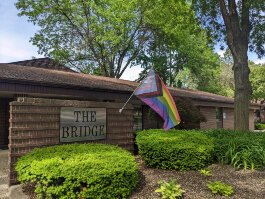WMEAC targets water quality education, sustainable business, energy efficiency
By: Deborah Johnson Wood
What do water quality education, the West Michigan Sustainable Business Forum, and energy efficient light bulbs have in common? They’re part of expanded programs that the Grand Rapids-based West Michigan Environmental Action Council (WMEAC) has developed to raise ecological awareness among young students, business leaders and homeowners.
WMEAC will soon kick off Teach for the Watershed, an interactive program that meets Michigan Science Curriculum Standards for elementary and middle school students. The program teaches students about watersheds, takes them to streams to conduct water quality tests and learn about the importance of healthy water, teaches them the impact of invasive species, and shows them how to use rain gardens to protect watersheds.
“We have two audiences,” says Rachel Hood, WMEAC executive director, “upper elementary and junior high students and their teachers. We hope to teach teachers how to incorporate pieces of their curriculum that are relevant and incorporate the watershed into the classroom.”
A new strategic plan by the sustainable business forum creates five new committees—sustainable design, social responsibility, transportation, energy demand management and renewable energy, and sustainable business practices—to identify strategies that help businesses incorporate sustainable practices into existing practices.
WMEAC plans to launch an energy program to deliver 5,000 energy efficient light bulbs to five communities and teach about the energy savings homeowners can have by adopting simple energy conservation techniques. The Michigan Public Service Commission awarded WMEAC a grant for the program.
“Only about 20 percent of the market has been saturated with energy efficient bulbs,” Hood adds. “The compact fluorescent bulbs contain a small amount of mercury and need to be disposed of as hazardous waste. We also want to increase the number of locations people can drop off the bulbs for disposal.”
Source: Rachel Hood, West Michigan Environmental Action Council
Deborah Johnson Wood is development news editor for Rapid Growth Media. She can be contacted at deborah@rapidgrowthmedia.com.









